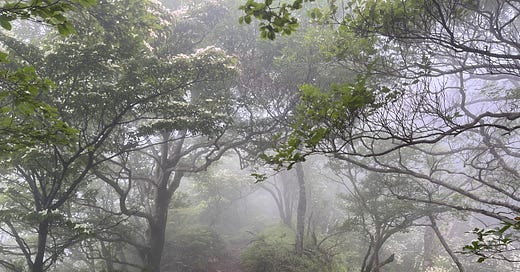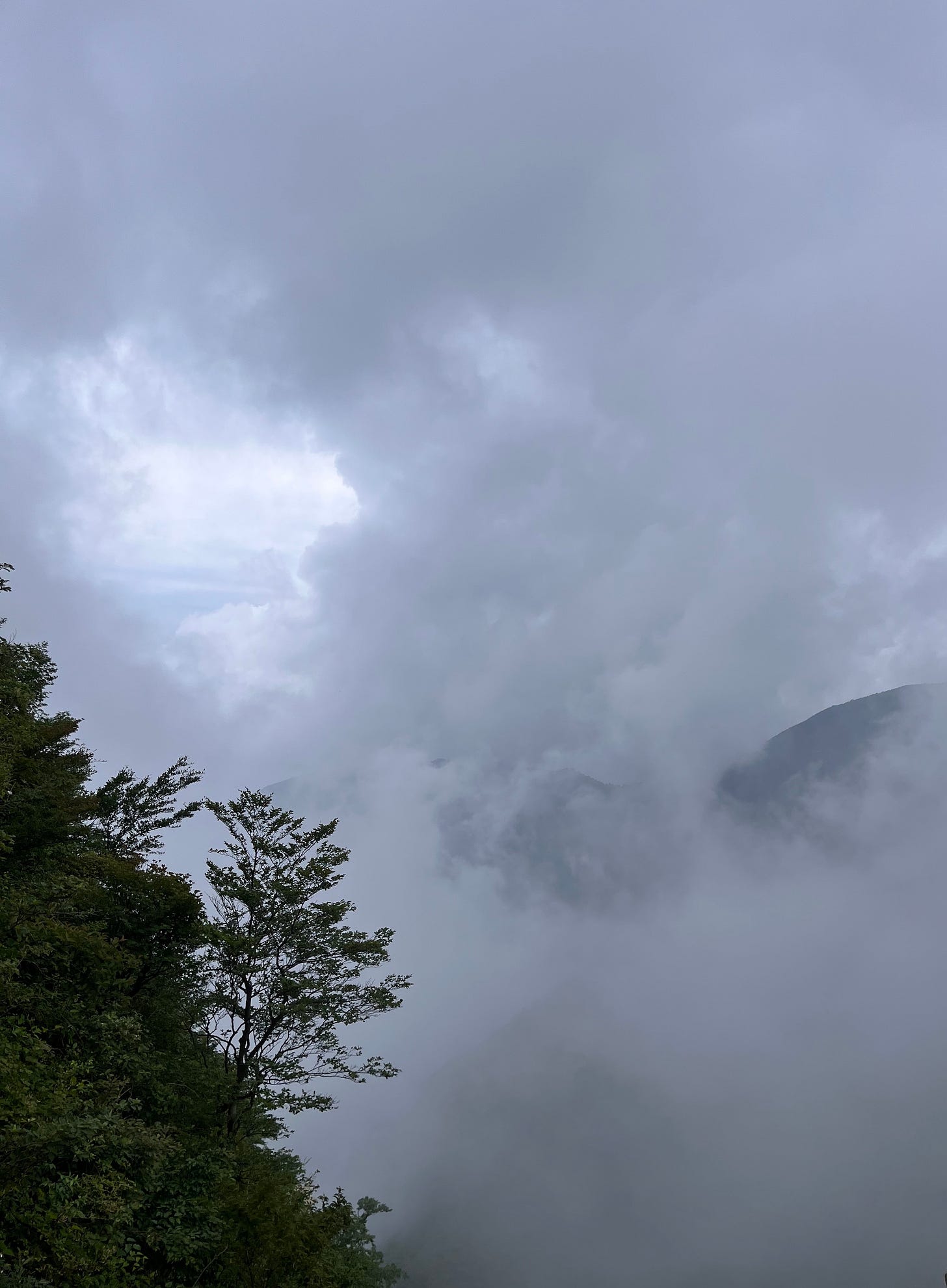“The need to retell experiences becomes your last means to try to redeem experience from aimless, pure accumulation.” — Mark Greif, Against Everything
There was a window at the beginning of May, after one childhood friend had left and the other had yet to arrive, before my cousins and three different friends came in from out of town, before New York, before immigration and the broken baggage claim, before we crammed sixteen of us into my parents’ house to celebrate 50 years of marriage, before the wildfire smoke, before upstate, before Tanzawa on the longest days of the year.
The window was after Gwangju and Kyoto, which were one after the other, after days of press tour buses, after waves of new journalists, new artists, new artworks, new conversations, conspiratorial scowls and eye-rolls, after so much rain, after my phone separated itself from me, after I left Seoul without it, went back to Tokyo, left again for Kyoto. After we were in Izu, doing whatever is the opposite of wasting our youth (spending it?).
As the days got longer, they offered more, more, more, MOAR, more laughs to go with all that light. More first encounters, more sweet reunions, more moments that seemed like part of some grand astrological spell, on planes, trains, in rain, oceans, alleyway bars, on mountains, dance floors. We went hiking, diving, up, down, through, we submerged, we emerged. The weather was brilliant, miserable, one day in New York it was just orange.
As the daylight grew, as the hours stretched to accommodate more life, more experience, all the while, I was moving.
In that window in May, I went to The Japan Times office to record a podcast episode about what I’d seen in Kyoto. It was a Monday. I got home and ate dinner. The next time I got on the train or met a human being was Thursday, the following week. Ten days had passed.
At first, the not moving had been intentional. Rest, yes, I thought. Rest. The spring had contained plenty of activity for this novelty seeker, she should rest, yes. She should read, and eat tofu, do yoga, go for walks, sit quietly in her house.
Late in the week, sitting in my apartment, I saw it was going to rain. I walked to the store, spent ¥17,980 on a used game console, and came home. At 7pm the next day, the new Zelda arrived in the mail.
In 2018, I wanted to leave New York. I knew that if I renewed my lease on my apartment I wouldn’t, so Sarah and I cooked up a plan to have me stay in her parents’ cabin in the Catskills while I figured out how to move to Asia. People came to visit, but mostly I was alone. I led the lifestyle of a city hipster in the mountains: I ate farm eggs and local tomatoes. I befriended the poor neighbors as well as the bougie ones. I took walks at sunset after work. On Saturdays I patronized the only local business in town, a yoga studio next to the post office. I hiked every mountain within an hour’s drive.
The days were long and beautiful, lush and exploding with green, the creek rushing, the air crazy with crickets raving and fucking. But after dark I got scared. There were bears, and a murder shed, and Trump supporters. There were no street lights, and everyone I knew was a two and a half hour drive away, and I was probably the only one on the block without a gun. Fear settles on your shoulders and just sits there until morning, like two heavy hands of a killer. Once the sun was down I started to panic: Had I fucked up my life in a big way, had I put too many things into motion that couldn’t be undone, was all this mountain rollicking just a form of coping with my own stupid choices?
I played Zelda.
In an open world game, the player is not told what to do in any specific order. In Zelda, you have a vague sense that you should have goals, but you could spend an incredibly long time doing side quests that don’t advance the story, or just wander around picking mushrooms and breaking rocks open and cooking little meals. (It is weird, then, when I break into a run in the game. I’ve probably spent 200 hours playing Breath of the Wild and Tears of the Kingdom; where exactly am I going in such a hurry?)
It’s the ideal analog to a world full of actual monsters. And though gamer culture, with its ugly chairs, bad posture, and reinforced screentime, holds no appeal for me, this world, I’m certain, offers as much art as the painting inside or the mountain outside. Also, you can quit without saving.
In 1998, we got Zelda: Ocarina of Time on N64 for Christmas. I was ten. My brother was in high school, and we spent all the hours between meals over Christmas vacation in our pajamas, playing. Rather, he played, and I watched. After I went to bed he would keep going, and I have more than one memory of being shaken awake with him standing over me, asking unemotionally, as if this were a very normal sibling interaction, “yo I’m at the temple boss wanna watch me beat him.”
Yes, obviously, I did.
My brother claims these moments have left a much stronger impression on me than they did on him. I believe it. Since that age Zelda has dug many new routes on my emotional map.
In that same window in May that I lost all sense of time and society, my own friend May was getting ready to come to Japan. The first thing we ever bonded over was Majora’s Mask, the sequel to Ocarina of Time, which came out when we were twelve. Most of our friends who were the children of immigrants had strict parents, but ours were on a different level. We didn’t go anywhere with boys, we didn’t go to the mall, we didn’t “hang around.” We called each other on the telephone and discussed Zelda.
When I was originally scheming with N to move to Japan, I read the apocryphal Shigeru Miyamoto origin story of him growing up in rural Kyoto exploring holes and caves, formative years of curiosity that would lead him to design Zelda, Mario, and Star Fox. “I want to move to rural Japan and look in holes and make up stories,” I told N as we sought to cement that distant fantasy.
When Tears of the Kingdom came out, I heard that even though you’ve lost everything you’ve owned from the first game, you could still access your horses. Not me, unfortunately: All those months in the Catskills I had been playing on N’s console (actually, his brother’s), which was now long gone. Some things, it seems, can’t be recovered.
Two weeks ago in New York, I found myself strangely elated to realize that I had reached a temple boss on the day when my sister and her husband were driving their son to the airport, leaving behind their 14-year-old. He was on the couch in his pajamas playing Breath of the Wild, which he had just recently started, as it was summer vacation. I sidled up to him. “yo I’m at the temple boss wanna watch me beat him.”
“Sure.” We hooked up the console.
It was a trip highlight.
In Mark Greif’s book Against Everything, he argues against a certain way that we collect “experiences.” He derides what he calls an obsession with experiences and the belief that having more of them means we are “really living.”
Line after line I feel taken apart, like watching a master sushi chef eviscerate a huge piece of tuna with just a few swift motions. “Sex and intoxication are the most famous techniques the young use to create experience.” Mm hm. “Travel becomes the main new experience people remember when sex and intoxication stop being the sole authoritative ones.” Check… “Truly dissatisfied persons, maybe more than anyone else, take a large proportion of their experience from books.” I… “Or they find they can double their own little experience, and make a second pass at the day-to-day, by writing it down.” Shit.
Stories of coincidence from the spring so charming and serendipitous that I told and retold them to rooms full of rapt ears, immediately sounded hollow and ridiculous: “Accident is precipitated; immediacy is studied; fate is forced.”
“The concept of experience attains its full dominion when it makes its own standard, dependent on sheer quantity — on filling up, or using up, a life,” he writes.
All that moving, all that more. All those souvenirs, all those photos. The endless retelling of stories in bars and dispatched in biweekly letters. Life as stand-up material.
In place of chasing experiences, Greif favors aestheticism: to live by mustering the intensity to look at every object for a very long time, as you would an art object; and perfectionism: to constantly seek worthy examples for the self, both in people and things, to summon new aspects for a higher you. “If you are called to change your life by any example, and your self responds — you must change your life. And once you change, change again.”
Zelda, then, is my own personal antidote to my own personal obsession with experiences. You can accumulate something — hours — and you can save something — your place in the game — but at the end of it all, there is nothing to show. The more stuff you collect and the more you accomplish, the closer you feel to the horrible moment when the game will end. The more you play, the less you want to tell people. There is nothing meaningful to capture, very little to share. Unless you’re trying to impress a room full of Redditors, it is impossible to regale a crowd with your Zelda exploits (though I have tried.)
It is the definition of wasting time. YOLO, the precept by which the concept of experience encourages a spirit of recklessness, as Greif puts it, doesn’t work here; without the threat of mortality, you can just make the same mistakes over and over and over, die, reload, die, repeatedly going nowhere and learning nothing.
Until night falls, and maybe out in the distance, something glows and calls you forward.
I have two new pieces out that I am proud to share: One is a personal essay about water and Daoism set at the Gwangju Biennale, and one is an essay-review of Marina Abramović’s overnight horror art installation in Niigata. Please enjoy.







❤️❤️❤️